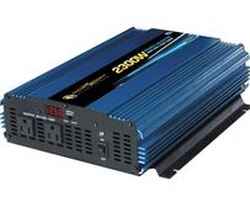 Inverter for Use with an Automobile
Inverter for Use with an Automobile As noted in my original post it's a good idea to consider a generator that will run on propane or natural gas. There are few inverter type generators that come from the factory able to run off of propane, but Champion has a model that came out a couple of years ago that might be a good fit for many households. It's a 3400 watt dual-fuel (gas or propane) model, so will run quite a lot in the average household, including possibly a small window air conditioner. Of course the trade-off, being a larger unit, is that it will use more fuel and is heavier than the 2000 watt models mentioned below. But it does have wheels, and electric start, which are advantageous. The cost is a little over $1,000 - (Update - 8/19/23 - Champion also now has a dual fuel 2000W model available on Amazon for about $550 that is occasionally on sale for $449). I've posted a photo of the models below.
Another option is to purchase a gas-only model (Honda, Yamaha, Champion, Ryobi, etc) and convert it to tri-fuel (gas, propane, or natural gas). The kits cost about $200 and you'll need to be reasonably mechanical (or know someone who is) to install the kit. Here is a link to a supplier that I've successfully used: www.MotorSnorkel.com - the benefit to this type of kit is that you can use 20 lb propane bottles (high pressure LNG like that used with your BBQ) or attach directly to your home's natural gas line (low-pressure natural gas). You'll want to have a licensed plumber install an attachment point for natural gas use, or you may be able to use the attachment point for your existing BBQ if it currently operates off of your home's natural gas supply. Note that with low-pressure natural gas you'll get slightly less performance from the generator, but you'll have virtually unlimited runtime as you won't run out of fuel, assuming that natural gas is still flowing to your home.
Another item I mentioned in my prior post was a transfer switch. I think as most transfer switches are sold in areas with inclement weather, the majority seem to be designed for interior installation, while many main electrical panels in California are on the exterior of the house. I opted for a transfer switch that is rated for exterior use (it sits next to the main electrical panel) and is a 4-circuit model. There are models with many more circuits, but as noted prior, are mostly for interior installation. As my generator is small (2000W) it works perfectly to power the refrigerator, a few lights, the TV, and a few electrical outlets to charge the phone, power the internet router/modem etc. I've posted below a photo of the 6-circuit model of the transfer switch that I use -- similar profile but only 4-circuits and no power meters (the connection on the bottom of the box will be different as well, but should be compatible with the Champion generator noted above).
**************************************************************************************
4/7/2015
My sympathies are with the survivors of the recent Nepal earthquake -- very devastating and it seems like we haven't heard the worst of it yet. But could we be next?
As we've all been told for many years, L.A. and Orange County is due for a massive quake at some point in the not-too-distant future, with all of the accompanying devastation and chaos.
One of the things that struck me during the aftermath of Hurricane Katrina and Hurricane Sandy was that the lack of electricity was a game-changer. We've become so dependent upon electricity that it is more than just an inconvenience. Which got me to thinking about the importance of having a generator during a natural disaster. But it's a tough investment to swallow here in California, as it is something that we may never use if the "big one" doesn't hit in our lifetime. On the other hand, if it does, then no generator can be too large or be too reliable! Of course if one is an avid camper, RV'er, tailgater, or is a contractor, then a generator is second nature and you can get some additional utility out of it above and beyond disaster preparedness.
The other issue during a natural disaster is that fuel for both cars and generators is often in short supply (recall the long lines of people waiting for gas at the gas stations during Hurricane Sandy) -- if there's no electricity, then generally there isn't any electricity available to pump gas either. Storing fuel in quantities large enough to feed a generator for a few days seems dangerous, not to mention that fuel goes stale after a few months and must be rotated, replacing soon-to-be-stale gas with fresh fuel -- a lot of work.
If you can't/don't want to make the investment in a generator, a reasonable alternative is an AC-DC converter. Small models plug into the convenience outlet of your car, and larger models clamp directly onto the car battery. A quick online search indicates you can pick up a 900 watt model for about $85 and a 2,300 watt model for about $250 (both were at Lowe's). Either should give you enough juice to run a small refrigerator, a few light bulbs (the low-power consumption bulbs only use about 14 watts/bulb so are very efficient), charge your cellphone, and maybe run a small TV. The bonus is your car already has an engine and battery, and usually has gas in it, so there's no additional maintenance or cost!
If you do elect to purchase a generator, after trying a few out, here are my recommendations:
- Purchase one light enough to move easily -- most 2,000 watt generators are 50 lbs or less. Above that and they begin to get heavier.
- Consider an inverter-type generator -- they run quieter, use less fuel (very important when fuel is scarce) and won't fry your important electronics
- If you use gasoline in the generator, use a fuel stabilizer such as Stabil in both the fuel tank and any stored gasoline -- it will reduce water in the fuel and lengthen the life of the gas
- After each use, drain the gas tank and the carburetor to avoid gumming up the fuel system -- very important to insure that it starts when you need it most!
- Consider a propane conversion kit (or purchase a pre-converted model) -- they run cleaner, fuel is easier to store, and doesn't need to be rotated (20 lb BBQ type propane tanks) -- and no need to clean out the fuel tank/carburetor after each use.
- Share the cost with a neighbor -- a slightly larger model will allow both households to maintain some level of normalcy during a power outage
- Make sure that you have a few heavy duty, long extension cords to run from the generator to the house
- If you have a refrigerator that is too heavy to move to gain access to the power cord, you may want to consider having an electrician install a transfer switch, which allows the generator to back-feed into a few circuits in your house, while isolating them from the main panel (you don't want to shock any power company personnel who may be working on the lines)
Just some thoughts -- and make sure that you have a few days of food and water tucked away as well.

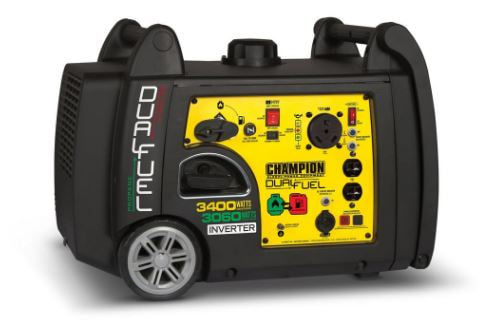
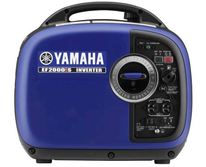
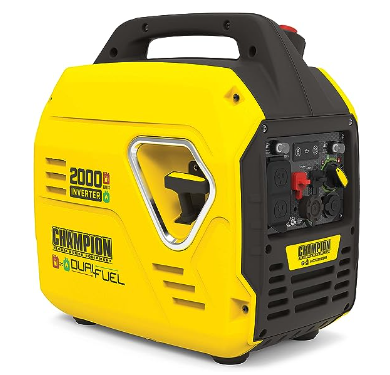
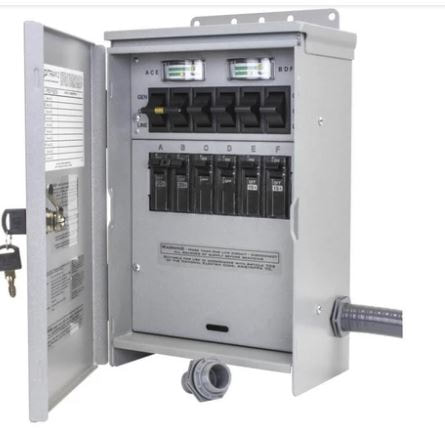

 RSS Feed
RSS Feed